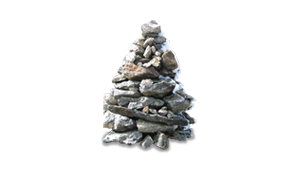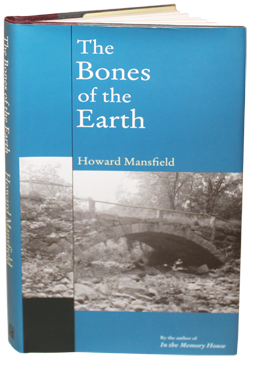THE BONES OF THE EARTH
Counterpoint, ISBN: 1593761392
“A profound curiosity and a rare humanity underlie the elegant work of Howard Mansfield. He is a master sleuth, an invested listener, a credible and compassionate guide to our future and our past. He is a writer I read because there is real wisdom in his words, because there’s nobody else in this generation who writes so meaningfully about what really matters in the American landscape.”
—Beth Kephart, author of A Slant of Sun
“Howard Mansfield has never written an uninteresting or dull sentence. All of his books are emotionally and intellectually nourishing. He is something like a cultural psychologist along with being a first-class cultural historian. He is humane, witty, bright-minded, and rigorously intelligent. He and his wife rescued the doomed runt of a litter of pigs and raised it to be the 175-pound Mr. Hogwood, a living symbol of Howard Mansfield’s care for the American, New England, history he writes so well about. His deep subject is Time: how we deal with it and how it deals with us. This beautiful book is about Time and Rocks.”
—Guy Davenport, author of The Death of Picasso
At first, The Bones of the Earth seems the work of a New England naturalist with whom urban dwellers would have little in common. But, as William Cullen Bryant observed in “Thanatopsis,” “To him who in the love of Nature holds / Communion with her visible forms, she speaks / A various language.” Howard Mansfield has heard that voice, nuanced and textured, and translated it into a kind of Esperanto, accessible to everyone. His sense of place is so unerringly accurate that walking sticks, stones, cemeteries, and bridges—familiar words—metamorphose into images. One may never have seen an elm or an otter, yet each assumes a reality of its own, as if it always existed in the collective memory and needed only the power of language to bring it to life. One does not even have to know what an otter looks like to be moved by his essay “The Otter Mates for Life,” his account of a friend’s mixed emotions about hunting otters, knowing that they mourn their dead with the same intensity, often chillingly audible, as humans do. Mansfield’s friend eventually realized the pain he was inflicting on innocent animals and stopped hunting them, not so much to alleviate their misery as his own. The essay is also a brilliant example of the way narration can run parallel to description, with the two eventually meeting in the sobering conclusion that those who hear nature’s voice have achieved a kind of freedom that the corporate world would envy.
Howard Mansfield has heard nature’s various language, and one hopes young college students will hear it also. Several essays in The Bones of the Earth, particularly “The Otter Mates for Life,” belong in a freshman anthology as prose models illustrating the technique of proceeding from the particular to the universal. Textbook publishers, take note.
—Bernard F. Dick, Fairleigh Dickinson University, World Literature Today.
Planetizen Top Ten Books for 2005, Honorable Mention. Planetizen is the Planning and Development Network.
“In The Same Ax, Twice (2000), Mansfield queried the multiple meanings of the popular practice of restoring historical objects, an impetus of concern with the past that carries into this volume. Instead of considering restoration, however, Mansfield plays his thoughts off objects of place as disparate as presentation walking canes, regulations on impromptu cemetery memorials, the geology beneath Keene, New Hampshire, the commercial strip outside Nashua, New Hampshire; and the auction of his neighbor’s house. The Granite State is the setting for all but a few of Mansfield’s ruminations, and there is where the author finds his dominant theme of the yearning to center the world, to create an axis mundi. His antithetical theme within the essays is time’s encroachment on the human desire to fix the past in place. Mansfield so observantly develops the antagonism in quite different contexts that expectations ride high from essay to essay. Connoisseurs of seeing the world in an oyster, or even a small state, will savor Mansfield’s style.”
—Gilbert Taylor, Booklist
Book Sense 76 December:
“Mansfield’s brilliant and moving writing focuses on the loss and restoration of cultural memory as we are asked to meditate on some of the worlds oldest landmarks — quite literally sticks and stones. This book should be read and treasured by all who thirst for a greater sense of belonging in our increasingly rootless age.”
—Dan Chartrand, Water Street Books, Exeter, NH
Each of Mansfield’s 11 essays is deep as a well… Mansfield’s genius is to take the familiar … and help us see with fresh eyes by layering new information… He helps us appreciate what we have — and what we may lose if we ain’t careful.
—The Concord Monitor
You could skate gracefully through memory on Mansfield’s narratives, through the past as history and the past as myth and back again to a present that’s in many ways disconnected from that past… It’s tempting to quote from all of the essays in The Bones of the Earth; the collection is a kind of thoughtful bushwhack through time and place, rendered with intelligence and elegance.
—The Monadnock Ledger
“The Bones of the Earth is a book of joyful wonder and discovery, of perceptions expanded by knowledge… Mansfield shows us how much we’re not seeing in what we see around us nowadays. The Bones of the Earth challenges us to cherish our natural and cultural heritage, while delighting us with insights inspired by Mansfield’s research, his gift for vigorous, empathetic observation, and his love of the lasting world.”
—William Craig, The Valley News (Lebanon, N.H.)
Christianity Today picks The Bones of the Earth as one of the Top Ten Books of 2004:
“He writes with wit and passion; he has an eye for the luminous detail, and wears his learning lightly.”
“In witty essays that recall both Thoreau’s Walden and Roland Barthes’ Mythologies, Mansfield ruminates on American history by unpacking our connection to the landscape.”
—Utne Reader
“Reading Bones of the Earth is a little like archaeology. Each essay is a rare find: an exciting bit of history, a revelation about how a forgotten culture operated, an interview with someone unexpected… There are plenty of interesting tidbits and curious facts throughout the book to keep the pages turning. But it is the bigger picture, the epiphany, that makes this book great. Time and again, people fail to recognize the miraculous natural world around them.”
“We need people to dig into our past and show that we once knew these truths but have maybe forgotten a little. Maybe a lot. Bones of the Earth is the chronicle of one man finding the wonders of the commonplace and revealing the crass obfuscation of what’s important by modern commercial excess. Buy this book to start remembering. Consider it a first step to helping the world be a better place.”
—Keith Demanche, The Wire, Portsmouth, New Hampshire

